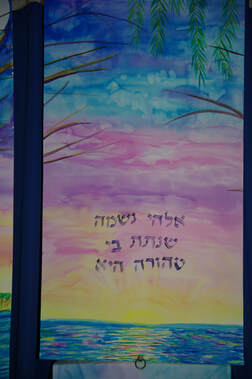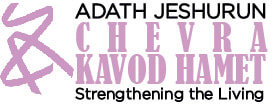Chevra Kavod Hamet (Society to Honor the Deceased)
|
Jewish tradition teaches us that all people are equal in death and that no one should be shamed on his or her last day on earth because he or she is poor.
Formerly, they were wont to bring out the rich for burial on a dargesh [a tall stately bed, ornamented and covered with rich coverlets] and the poor on a plain bier [flat frame], and the poor felt shamed: they instituted therefore that all should be brought out on a plain bier, out of deference for the poor……
Formerly, the expense of taking the dead out to burial fell harder on his near-of-kin than his death so that the dead man's near-of-kin abandoned him and fled, until at last Rabban Gamliel came forward and, disregarding his own station, commanded that he be buried in linen [rather than expensive woolen] vestments and thereafter the people followed his lead to be buried in linen vestments. Said Rabbi Papa, “And nowadays all the world follows the practice of burial in a paltry shroud that costs but a zuz.” ~ Tractate Moed Katan of the Babylonian Talmud: 27b |
Adath Jeshurun Congregation’s nationally-recognized Chevra Kavod Hamet was founded in 1977 under the leadership of Rabbi Arnold Goodman. Many of the original members are still active in the Chevra.
The Chevra Kavod Hamet fueled a modern revival of the centuries-old rituals of traditional Jewish funerals. Numerous congregations around the country have subsequently created their own Chevra Kadisha (Sacred Society) modeled after Adath’s Chevra Kavod Hamet.
Staffed entirely by volunteers, the Chevra provides a traditional Jewish funeral at a modest cost to any Adath member upon request.
The Chevra Kavod Hamet fueled a modern revival of the centuries-old rituals of traditional Jewish funerals. Numerous congregations around the country have subsequently created their own Chevra Kadisha (Sacred Society) modeled after Adath’s Chevra Kavod Hamet.
Staffed entirely by volunteers, the Chevra provides a traditional Jewish funeral at a modest cost to any Adath member upon request.
Descriptions of Services
|
The Chevra provides all services related to Jewish tradition and halacha, and contracts with a funeral home to provide other services. Services provided by the Chevra include:
|
Services provided by the funeral home include:
|
Utilizing the ChevraHere are documents you may find helpful when in need of assistance from the Chevra Kavod Hamet:
|
Ways to VolunteerThere are 18 Ways You Can Help. Volunteers contribute their time and talents to administrative tasks, education, outreach, or ritual participation, whatever is comfortable for them. There is a role for everyone. Join the hundreds of Adath members who provide meaningful emotional and spiritual consolation to those who have experienced a loss.
Through the Chevra Kavod Hamet, members of our Adath community can be present for mourners and perform final acts of loving kindness (gemilut hasadim) for our deceased congregants. Performing tahara, sitting shmira (sitting with the met/metah until burial) and other Chevra services are considered hesed shel emet (true act of kindness), the ultimate act of love and kindness, because the deceased cannot ask the volunteers to do it for them and they are not able to repay the acts or thank those who performed the mitzvot. Because of this tradition, the members of the Chevra do not reveal the names of those who performed tahara, sat shmira, and performed other Chevra services. Members of the Chevra say that they find volunteering with the Chevra to be an inspiring, moving and spiritual experience. They also find it reassuring to know their physical body will be treated with dignity, respect and reverence after death. Each volunteer is touched in some way. Sitting shmira (Guard/Watch)
Sitting shmira is a beautiful way to support members of our Jewish community and a great way to provide comfort to the family and honor the deceased. If you've ever considered performing this mitzvah, but have no idea where to start, we encourage you to check out the Shomrim Handbook to answer your questions, prepare you to sit shmira and learn all there is to know about being a Shomer/Shomeret.
Download the Quick Guide to Sitting Shmira Download the Shomrim Handbook Download the Shomrim role description Commentary: The Myth Of The Mitzvah No One Can Thank You For Tahara (Ritual purification)
Tahara is the tradition of ritual purification of the deceased. “As he came, so shall he go” (Ecclesiastes 5:15). Just as babies are pure when they are born and are immediately washed and dressed, the deceased are washed, ritually purified and dressed so their departure is as pure as their arrival. During tahara, the met/metah (male/female deceased) is treated with utmost respect and dignity in accordance with Jewish tradition. Organ, tissue or cornea/eye donation does not affect the ability to perform tahara, nor does autopsy. Download informational sheet on tahara |
Contact Us
To pre-plan a Chevra funeral, volunteer or host a Chevra speaker, contact Sue and Peter Gross at 612.384.8366 or [email protected].


